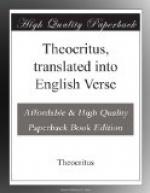To which heaven’s rain
gives increase: yet what land
Is green as low-lying Egypt, when the Nile
Wells forth and piecemeal breaks the sodden glebe?
Where are like cities, peopled by like men?
Lo he hath seen three hundred towns arise,
Three thousand, yea three myriad; and o’er all
He rules, the prince of heroes, Ptolemy.
Claims half Phoenicia, and half Araby,
Syria and Libya, and the AEthiops murk;
Sways the Pamphylian and Cilician braves,
The Lycian and the Carian trained to war,
And all the isles: for never fleet like his
Rode upon ocean: land and sea alike
And sounding rivers hail king Ptolemy.
Many are his horsemen, many his targeteers,
Whose burdened breast is bright with clashing steel:
Light are all royal treasuries, weighed with his.
For wealth from all climes travels day by day
To his rich realm, a hive of prosperous peace.
No foeman’s tramp scares monster-peopled Nile,
Waking to war her far-off villages:
No armed robber from his war-ship leaps
To spoil the herds of Egypt. Such a prince
Sits throned in her broad plains, in whose right arm
Quivers the spear, the bright-haired Ptolemy.
Like a true king, he guards with might and main
The wealth his sires’ arm won him and his own.
Nor strown all idly o’er his sumptuous halls
Lie piles that seem the work of labouring ants.
The holy homes of gods are rich therewith;
Theirs are the firstfruits, earnest aye of more.
And freely mighty kings thereof partake,
Freely great cities, freely honoured friends.
None entered e’er the sacred lists of song,
Whose lips could breathe sweet music, but he gained
Fair guerdon at the hand of Ptolemy.
And Ptolemy do music’s votaries hymn
For his good gifts—hath man a fairer lot
Than to have earned much fame among mankind?
The Atridae’s name abides, while all the wealth
Won from the sack of Priam’s stately home
A mist closed o’er it, to be seen no more.
Ptolemy, he only, treads a path whose dust
Burns with the footprints of his ancestors,
And overlays those footprints with his own.
He raised rich shrines to mother and to sire,
There reared their forms in ivory and gold,
Passing in beauty, to befriend mankind.
Thighs of fat oxen oftentimes he burns
On crimsoning altars, as the months roll on,
Ay he and his staunch wife. No fairer bride
E’er clasped her lord in royal palaces:
And her heart’s love her brother-husband won.
In such blest union joined the immortal pair
Whom queenly Rhea bore, and heaven obeys:
One couch the maiden of the rainbow decks
With myrrh-dipt hands for Hera and for Zeus.
Is green as low-lying Egypt, when the Nile
Wells forth and piecemeal breaks the sodden glebe?
Where are like cities, peopled by like men?
Lo he hath seen three hundred towns arise,
Three thousand, yea three myriad; and o’er all
He rules, the prince of heroes, Ptolemy.
Claims half Phoenicia, and half Araby,
Syria and Libya, and the AEthiops murk;
Sways the Pamphylian and Cilician braves,
The Lycian and the Carian trained to war,
And all the isles: for never fleet like his
Rode upon ocean: land and sea alike
And sounding rivers hail king Ptolemy.
Many are his horsemen, many his targeteers,
Whose burdened breast is bright with clashing steel:
Light are all royal treasuries, weighed with his.
For wealth from all climes travels day by day
To his rich realm, a hive of prosperous peace.
No foeman’s tramp scares monster-peopled Nile,
Waking to war her far-off villages:
No armed robber from his war-ship leaps
To spoil the herds of Egypt. Such a prince
Sits throned in her broad plains, in whose right arm
Quivers the spear, the bright-haired Ptolemy.
Like a true king, he guards with might and main
The wealth his sires’ arm won him and his own.
Nor strown all idly o’er his sumptuous halls
Lie piles that seem the work of labouring ants.
The holy homes of gods are rich therewith;
Theirs are the firstfruits, earnest aye of more.
And freely mighty kings thereof partake,
Freely great cities, freely honoured friends.
None entered e’er the sacred lists of song,
Whose lips could breathe sweet music, but he gained
Fair guerdon at the hand of Ptolemy.
And Ptolemy do music’s votaries hymn
For his good gifts—hath man a fairer lot
Than to have earned much fame among mankind?
The Atridae’s name abides, while all the wealth
Won from the sack of Priam’s stately home
A mist closed o’er it, to be seen no more.
Ptolemy, he only, treads a path whose dust
Burns with the footprints of his ancestors,
And overlays those footprints with his own.
He raised rich shrines to mother and to sire,
There reared their forms in ivory and gold,
Passing in beauty, to befriend mankind.
Thighs of fat oxen oftentimes he burns
On crimsoning altars, as the months roll on,
Ay he and his staunch wife. No fairer bride
E’er clasped her lord in royal palaces:
And her heart’s love her brother-husband won.
In such blest union joined the immortal pair
Whom queenly Rhea bore, and heaven obeys:
One couch the maiden of the rainbow decks
With myrrh-dipt hands for Hera and for Zeus.




